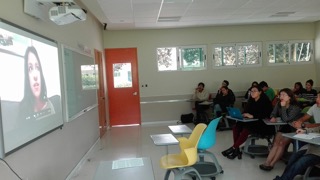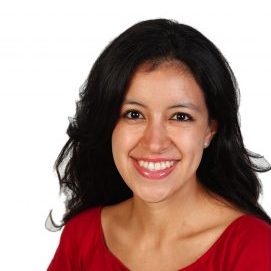EMBL School Ambassador Mariana Ruiz Velasco Leyva
Country: Mexico
Profile
Hi! My name is Mariana and I was born and raised in one of the largest cities of the world: Mexico City. I am a 3rd year PhD student at EMBL Heidelberg in the Zaugg group, where our driving biological question is to understand how the DNA conveys into phenotype in humans. This is a fascinating area of biology where I find many exciting questions that still need to be answered: What makes us unique? What happens if we have changes in the DNA (mutations) in key regulatory regions of the genome? How can the DNA be the same in all the cells of our body, but produce so many different outcomes, like a neuron or an osteocyte (bone cell)? A similar motivation for understanding more about the biology of the genome guided me in the first place to study the Undergraduate Program on Genomic Sciences and later a Masters degree in Biochemical Sciences, both of them in the National Autonomous University of Mexico.
During my bachelor’s degree, I participated in the iGEM competition, which fosters science communication. This was the first time when I presented in an auditorium (of my former high school) to talk to a group of students about why it was so cool to engineer bacteria so that we could integrate non-existing functions. I also talked about why being a scientist is such a nice academic path and about my own experiences in this field. I remembered it was a great exercise to think of analogies and examples that could explain our project to non-scientists and I overall enjoyed the whole experience very much! In the following years, I did an internship in the University of Cambridge and during that time I participated in the ‘CHaOS’ or Cambridge Hands on Science at the Science Festival. This was a very different audience as we received kids from 5-12 years but their knowledge was remarkable! It was definitely very challenging to answer all of the questions from these kids, some of them having both mom and dad professors at a highly prestigious university.
I think that an important part of being a good scientist involves us being able to share our discoveries with any kind of audience. We should make the knowledge accessible and easy to understand, while encouraging people to support research and technological development. Moreover, science communication was the original reason why I became interested in a biological path. If I am able to ignite the curiosity of future generations, I will feel accomplished and very happy.
Diary
Ever since Eva and Phillip gave us a lecture about the school ambassador program during the predoc course, I have been keen on participating as a school ambassador. Due to the limited time that I had during my visits back home and the never-ending load of work that any PhD student has, I postponed this idea for a while. It was a very fortunate coincidence that a couple of years later my cousin, who is a teacher in a Mexican high school (Tec de Monterrey, campus Morelia), contacted me and asked me whether I could deliver a 45 minutes class to her senior students, as part of her vocational education program.
The idea was fairly reasonable, I needed to talk to approximately 20 students about my motivations to pursue a scientific career, my experiences on studying both in Mexico and abroad, my research, and in general to reply to the questions that the students may have. It is important to say that these students were all considering biological and medical sciences paths, so it made perfect sense to show them that a scientific career was approachable and to solve their doubts. There was a little problem though… I was not supposed to be in Mexico for the days that the teacher suggested, so we ended up having a virtual school visit!
As you can see from the picture, it was a really challenging situation! If you have used Skype, FaceTime or had any video call, you can perfectly relate to the common difficulties that arise, like having a bad Wifi signal, time shifts of the voice, and confusion when more than one person speak at the same time. That already made me a bit nervous from the beginning. Luckily enough, the difficulties that I refer to were minimal and the experience turned out to be quite interesting.
The students asked me several types of questions, it became obvious that some of them were really considering enrolling in a scientific program and they raised very good and valid points. I also faced the difficulties of bringing my research to a more understandable level using everyday examples, as my PhD project deals with very abstract concepts. However, while most of the video call went well and was very enriching, some other questions were used to prevent uncomfortable silences, like: Is Germany cold? Or: How much do you earn? In any case, I believe that with this experience I helped a couple of students to decide on the research path and I also enjoyed putting myself in their shoes and remembering why I made the decisions that I made and that led me to choose a career that I love and enjoy most of the days. I would definitely do it again!


